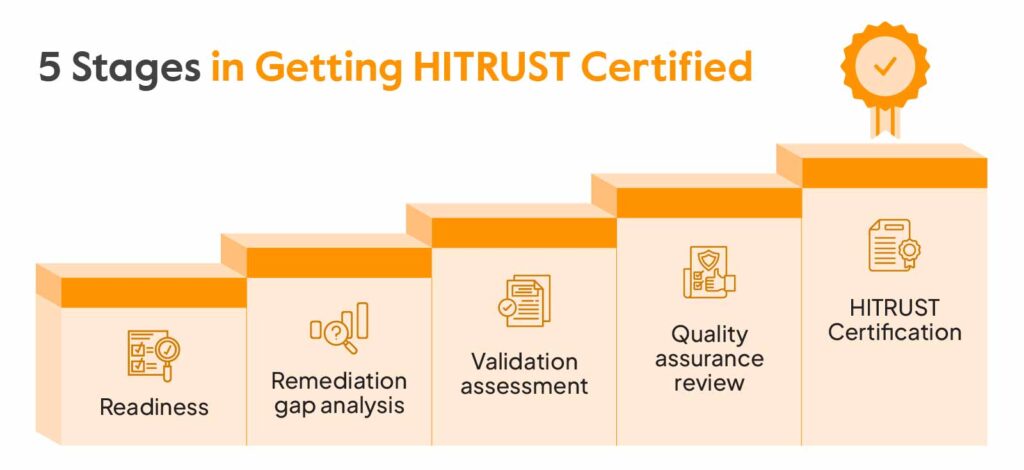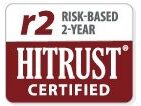In 2024, the Change Healthcare cyberattack compromised millions of patient records and crippled revenue cycle operations across the U.S. It was yet another wake-up call for healthcare IT leaders: cybersecurity isn’t just a compliance issue—it’s an operational imperative.
As cyber threats evolve and regulatory expectations tighten, developing a strong, cost-effective data security strategy has become a top priority. One of the most effective ways to strengthen your organization’s security posture is by partnering with vendors that are HITRUST certified.
In this guide, we’ll answer the most common questions about HITRUST and its role in healthcare IT:
- What is HITRUST?
- What does “HITRUST Certified” mean?
- Why does HITRUST certification matter in healthcare?
- Who should pursue HITRUST certification?
- Why should you choose a HITRUST certified cloud hosting provider?
We’ll also provide resources to help you take the next step in your data protection strategy.
What is HITRUST and Why Was It Created?
HITRUST (Health Information Trust Alliance) is a non-profit organization that created the HITRUST Common Security Framework (CSF)—a unified, comprehensive framework for managing security and privacy risks.
The HITRUST CSF is built on internationally recognized standards like ISO/IEC 27001 and 27002, and maps to other key frameworks and regulations, including:
This harmonized approach simplifies compliance by giving organizations a single, authoritative framework for securing sensitive data and demonstrating due diligence. It’s particularly valuable for healthcare organizations juggling multiple regulatory requirements.
HITRUST CSF vs HITRUST Certification: What’s the Difference?
The terms “HITRUST CSF” and “HITRUST certification” are often used interchangeably, but they’re not the same.
The HITRUST CSF is a framework: a prescriptive set of controls and guidelines that organizations can use to build strong, scalable security and privacy programs.
HITRUST certification is a formal designation: an organization earns it by undergoing a third-party validated assessment and meeting all applicable CSF requirements

Source: Sprinto
The certification process includes:
- A thorough audit of your security and privacy controls
- Evidence collection across 14 control categories
- Final attestation from a HITRUST-authorized assessor
Many organizations start by adopting the CSF to shape their policies and reduce compliance risk. Certification becomes a strategic next step—especially for vendors pursuing contracts with risk-sensitive healthcare institutions.
In short:
- Using the CSF = following best practices
- Being certified = proving it through independent verification
What Does “HITRUST Certified” Mean?
- Information Protection Program
- Endpoint Protection
- Portable Media Security
- Mobile Device Security
- Wireless Security
- Configuration Management
- Vulnerability Management
- Network Protection
- Transmission Protection
- Password Management
- Access Control
- Audit Logging & Monitoring
- Education, Training & Awareness
- Third-Party Security
- Incident Management
- Business Continuity & Disaster Recovery
- Risk Management
- Physical & Environmental Security
- Data Protection & Privacy
These categories encompass 49 control objectives and 156 specific controls, each aligned with national and international security standards.
Certification is valid for two years, with an interim audit conducted in year one to ensure ongoing compliance. HITRUST continuously evolves the CSF to reflect emerging risks—like AI-based cyberattacks—making certification not just a milestone, but a continuous commitment to improvement.
Additional Resources on HITRUST
For more information about HITRUST CSF, assessment, and certification – check out these additional resources:
- HITRUST: CSF – Our Cybersecurity Framework
- HITRUST: Cybersecurity Assessments and Certifications
- HITRUST: Cyber Risk Management at a Glance
Our hosting platform is r2 HITRUST Certified
We are proud that our hosting platform re-achieved r2 HITRUST certification, the most rigorous level of HITRUST certification.
Why Does HITRUST Certification Matter in Healthcare?
In healthcare, trust is everything—and HITRUST certification builds it from the ground up. It shows that your organization is taking a proactive, structured approach to security, rather than reacting to threats after the fact.
By achieving certification and/or partnering with HITRUST-certified vendors, you demonstrate that your organization:
- Protects sensitive healthcare data (e.g., PHI), reducing breach risk and safeguarding patient privacy
- Streamlines compliance with HIPAA, GDPR, and NIST, through a single integrated framework
- Demonstrates operational maturity, with repeatable governance, policies, and controls
- Accelerates partnerships, by reducing due diligence friction with risk-conscious healthcare clients
HITRUST certification helps organizations stand out in a crowded vendor landscape—especially when clients are tightening third-party risk standards.
Who Should Achieve HITRUST Certification?
HITRUST certification is ideal for any organization that handles regulated data, but it’s especially valuable for vendors that serve healthcare providers, such as:
- Cloud hosting and infrastructure providers
- SaaS platforms that process PHI
- EHR and revenue cycle vendors
- Telehealth and medtech firms
- Consultants with access to provider networks
These vendors are often held to the same standards as the healthcare systems they support. Certification accelerates trust and shortens sales cycles by proving security and compliance readiness from day one.
After major breaches like the 2024 Change Healthcare incident, many provider organizations are requiring HITRUST certification from vendors as a minimum standard—not a nice-to-have.
HITRUST certification is more than a badge—it’s a strategic asset in the healthcare industry. It builds trust, strengthens market position, simplifies compliance, and sets organizations apart in a landscape where risk is rising and expectations are high.
Why It’s Important to Choose a HITRUST Certified Cloud Hosting Provider
Your hosting provider plays a direct role in how securely your systems operate. Choosing a HITRUST certified cloud partner ensures that your infrastructure is backed by a company with independently validated controls.
Here’s what that means for you:
- Built-In Regulatory Compliance
They’ve already mapped controls to HIPAA, NIST, and GDPR—so you’re starting from a compliant foundation. - Proven Security Maturity
Hosting partners must meet strict benchmarks across encryption, access control, incident response, and more. - Faster Vendor Approvals
Certification reduces friction in procurement and shortens security reviews with your stakeholders. - Shared Accountability
Certified providers have skin in the game—strengthening your posture in the event of a breach or investigation. - Continuous Improvement
HITRUST requires regular re-assessment, ensuring your hosting environment evolves with the threat landscape.
Bottom line: HITRUST- certified providers offer confidence, credibility, and compliance—right out of the box.
Ready to Get Started with a HITRUST Certified Partner?
As a cloud services provider that has successfully achieved and maintained HITRUST certification, PSM is happy to answer any questions you have about HITRUST certification and the value of hosting your sensitive patient data and systems with a r2 HITRUST Certified hosting partner. Contact us to learn more.


